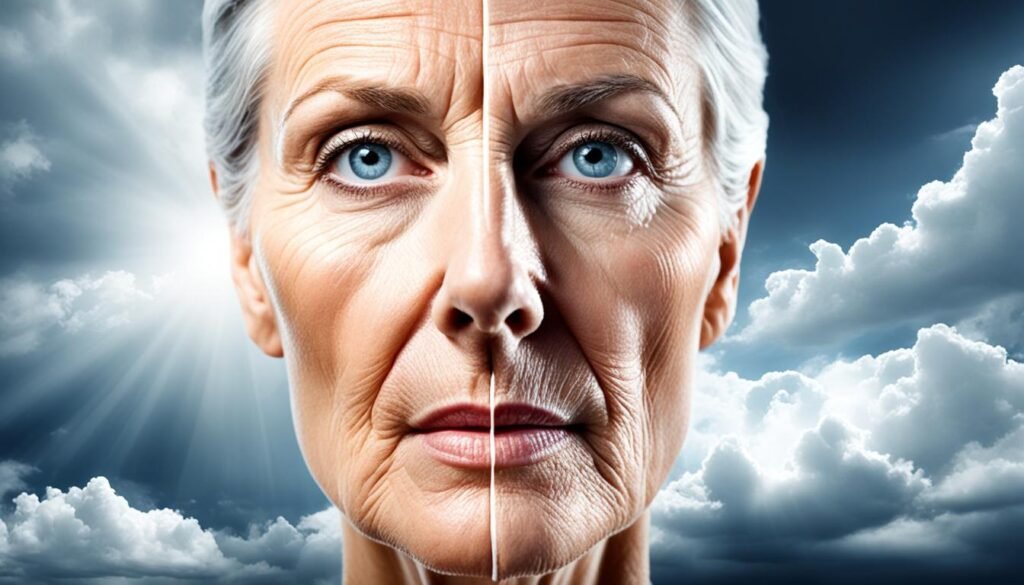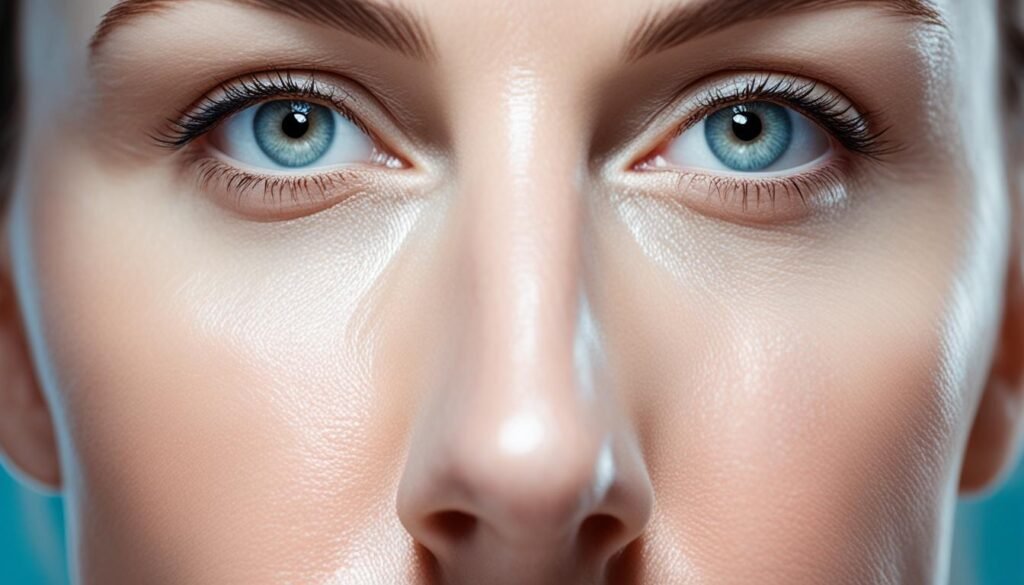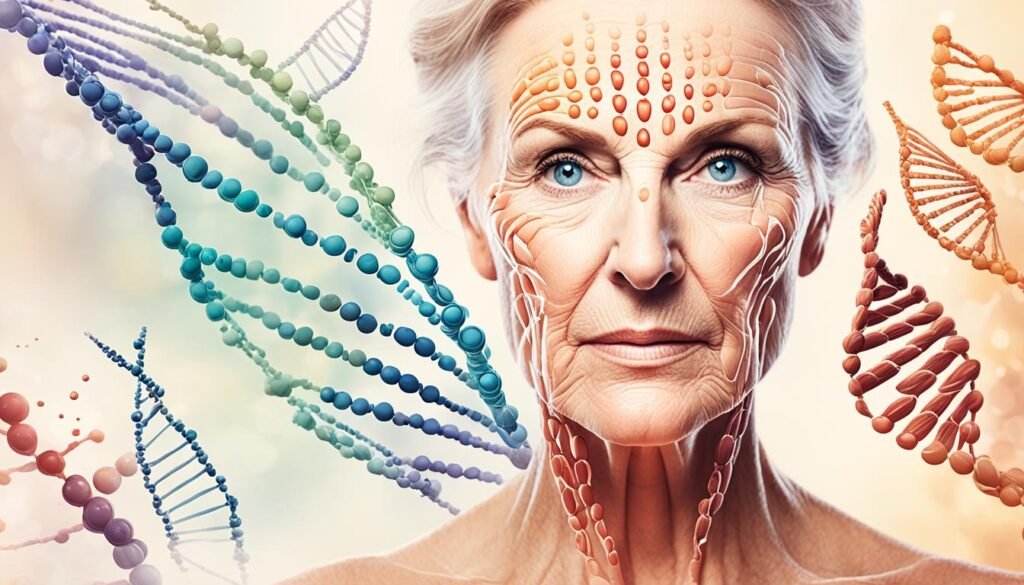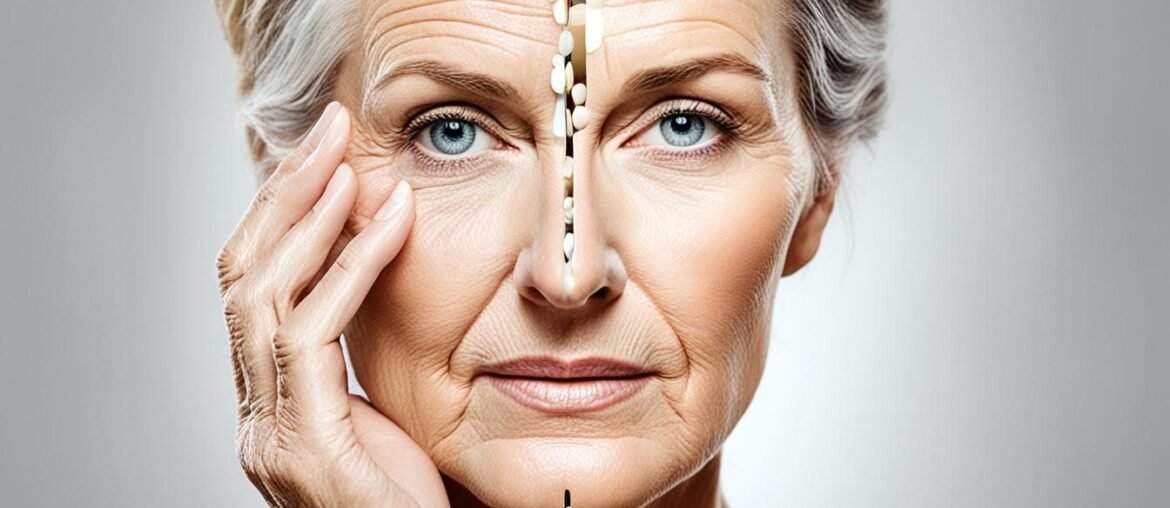Did you know that chronic stress can accelerate the skin aging process? It’s true. Multiple studies have revealed that stress can have a significant impact on the skin, leading to premature aging and various skin concerns such as wrinkles, dryness, and acne. Understanding the connection between stress and skin aging is crucial for preserving a youthful complexion and maintaining overall skin health.
Key Takeaways:
- Chronic stress can negatively impact the skin, leading to premature aging.
- Stress can stimulate oil production, clog pores, and contribute to acne formation.
- Cortisol, the stress hormone, plays a significant role in the aging process of the skin.
- Stress can compromise the skin’s barrier function, resulting in dryness and inflammation.
- Stress can worsen existing skin conditions and trigger the onset of new ones.
The Effects of Stress on the Skin
Stress can have significant effects on the skin, accelerating the aging process and leading to various skin concerns. The release of cortisol, a hormone triggered by stress, can stimulate oil production in the skin, resulting in clogged pores and the development of acne. The barrier function of the stratum corneum, the outermost layer of the skin, can also be impaired, causing dryness and itchiness.
Furthermore, stress weakens the immune system, disrupting the balance of bacteria on the skin and contributing to rashes and inflammation. The reduced elasticity of the skin caused by stress can promote the formation of wrinkles, further contributing to premature skin aging. The negative effects of stress on the skin are multi-faceted and can lead to an accelerated aging process.
| Effects of Stress on the Skin |
|---|
| Stimulates oil production, leading to clogged pores and acne |
| Impairs the barrier function of the stratum corneum, resulting in dryness and itchiness |
| Weakens the immune system, disrupting the balance of bacteria on the skin |
| Reduces elasticity and promotes the formation of wrinkles |
It is important to understand the effects of stress on the skin to develop strategies for maintaining a youthful complexion. By managing stress levels and implementing skincare routines and stress reduction techniques, it is possible to protect the skin from the negative effects of stress and promote skin health.
The Role of Cortisol in Skin Aging

Cortisol, the hormone released during periods of stress, plays a significant role in the aging process of the skin. High levels of cortisol can impair the production of collagen, a protein responsible for maintaining the skin’s elasticity and firmness. This can lead to the development of wrinkles and sagging skin.
Additionally, cortisol can interfere with the skin’s natural barrier function and disrupt the balance of moisture, resulting in dryness and inflammation. The chronic exposure to cortisol caused by prolonged stress can expedite the aging of the skin.
To have a better understanding, let’s take a look at the effects of cortisol on the skin aging process:
| Effects of Cortisol on Skin Aging | Consequences |
|---|---|
| Impaired collagen production | Development of wrinkles and sagging skin |
| Disruption of moisture balance | Dryness and inflammation |
| Reduced skin barrier function | Susceptibility to external irritants and allergens |
By understanding the role of cortisol in skin aging, we can take proactive steps to protect and maintain the health of our skin. Next, we will explore the impact of stress on the skin’s barrier function and how it contributes to premature skin aging.
The Impact of Stress on Skin Barrier Function
The skin’s barrier function is essential for maintaining skin health and preventing moisture loss. However, chronic stress can compromise the integrity of the skin barrier, making it more susceptible to external irritants, allergens, and dehydration. Studies have shown that stress can inhibit the skin’s ability to repair itself and retain moisture, leading to the development of dry skin and a dull complexion.
When we are stressed, our body produces cortisol, a hormone that can interfere with the skin’s natural protective barrier. This disruption weakens the barrier’s ability to retain moisture and defend against external stressors, leaving the skin vulnerable to damage. The skin may become more prone to inflammation, irritation, and sensitivity, further exacerbating dryness and other skin concerns.
Protecting and strengthening the skin barrier is crucial to mitigate the effects of stress on the skin aging process.
Effects of Stress on Skin Barrier Function:
- Increased transepidermal water loss (TEWL), leading to dryness
- Reduced production of natural moisturizing factors (NMFs), resulting in decreased skin hydration
- Impaired barrier repair mechanisms, hindering the self-recovery process
- Disruption of lipid layer composition, affecting the barrier’s function and stability
- Heightened sensitivity to environmental and chemical aggressors
By focusing on protecting and strengthening the skin barrier, individuals can enhance their skin’s resilience to stress-induced damage and maintain a healthy, radiant complexion.
Strategies to Protect and Strengthen the Skin Barrier:
| 1. Hydration | 2. Gentle Cleansing |
|---|---|
| Drink plenty of water to support internal hydration. | Use mild, non-stripping cleansers to avoid disrupting the barrier. |
| 3. Moisturization | 4. Barrier Repair Ingredients |
| Apply moisturizers containing hyaluronic acid, ceramides, or humectants to replenish and lock in moisture. | Look for skincare products with barrier-strengthening ingredients like niacinamide, cholesterol, or fatty acids. |
| 5. Sun Protection | 6. Stress Management |
| Shield your skin from UV damage with broad-spectrum sunscreen. | Engage in stress-reducing activities like meditation, deep breathing, or exercise to minimize the impact of stress on the skin. |
“A strong and healthy skin barrier is the foundation for resilient and youthful-looking skin.”
By incorporating these strategies into a skincare routine and maintaining a healthy lifestyle, individuals can mitigate the negative effects of stress on the skin barrier, promoting better skin health and a more vibrant complexion.
The Link Between Stress and Skin Conditions

Stress has a significant impact on the skin, exacerbating existing skin conditions and triggering the onset of new ones. Research has shown a clear link between stress and various skin concerns, including acne, psoriasis, eczema, and contact dermatitis.
The Worsening Effects of Stress on Acne
Acne is a common skin condition characterized by the formation of pimples, blackheads, and whiteheads. Stress can worsen acne by increasing the production of sebum, the oily substance that clogs pores and leads to bacterial growth. Additionally, stress-induced inflammation can further aggravate existing acne lesions, making them more inflamed and noticeable.
The Impact of Stress on Chronic Skin Conditions
Besides acne, stress can also exacerbate chronic skin conditions such as psoriasis, eczema, and contact dermatitis. Psoriasis is an autoimmune disease characterized by red, scaly patches on the skin. Studies have found that stress can trigger the onset or flare-ups of psoriasis, making the symptoms more severe. Eczema, another inflammatory skin condition, can also be intensified by stress, leading to increased redness, itching, and discomfort. Contact dermatitis, caused by allergens or irritants, can be worsened by stress, increasing the skin’s sensitivity and exacerbating the allergic response.
“Stress can act as a trigger for many skin conditions, worsening their symptoms and making them more challenging to manage,” says Dr. Emily Watson, a dermatologist at ClearSkin Clinic.
Stress, Immunity, and Inflammation
One of the key factors in the link between stress and skin conditions is the immune system’s response to stress. Stress has been shown to influence the immune system’s functioning, leading to an imbalance in immune responses. This imbalance can result in increased inflammation, which plays a significant role in the development and progression of various skin conditions. Moreover, stress-induced changes in the skin’s barrier function can make it more susceptible to irritants and allergens, further contributing to inflammation and skin reactions.
The Impact of Stress on Skin Conditions
| Skin Condition | Effect of Stress |
|---|---|
| Acne | Increased sebum production and inflammation |
| Psoriasis | Onset or flare-ups of symptoms |
| Eczema | Heightened redness, itching, and discomfort |
| Contact Dermatitis | Increased sensitivity and allergic response |
The table illustrates the impact of stress on various skin conditions, highlighting the specific effects stress can have on each condition.
Understanding the link between stress and skin conditions is essential for developing effective treatment plans that address both the underlying stress and the resulting skin issues. By managing stress levels and seeking appropriate medical care, individuals can minimize the impact of stress on their skin, leading to improved skin health and overall well-being.
Stress Management Techniques for Healthy Skin
Implementing effective stress management techniques can help protect the skin from the negative effects of stress and promote overall skin health. Managing stress is essential for preserving a youthful complexion and preventing premature skin aging. Here are some strategies and lifestyle changes that can help reduce stress levels and improve skin health.
1. Relaxation Techniques
Practicing relaxation techniques such as meditation, deep breathing exercises, and yoga can significantly reduce stress levels and promote a sense of calm. These techniques help activate the body’s relaxation response, reducing the production of stress hormones and promoting skin rejuvenation.
2. Regular Physical Exercise
Engaging in regular physical exercise is not only beneficial for your overall health but also for your skin. Exercise helps increase blood circulation, delivering essential oxygen and nutrients to the skin cells while removing toxins. It also reduces cortisol levels and releases endorphins, improving mood and reducing stress-related skin concerns.
3. Adequate Sleep
Getting enough sleep is crucial for managing stress and supporting skin health. During sleep, the body repairs and regenerates skin cells, helping to restore a healthy complexion. Lack of sleep can increase stress levels and lead to skin issues such as dullness, fine lines, and dark circles. Aim for 7-9 hours of quality sleep each night to promote optimal skin rejuvenation.
4. Healthy Lifestyle Choices
Adopting a healthy lifestyle can play a significant role in stress reduction and skin aging prevention. Consuming a balanced diet rich in fruits, vegetables, lean proteins, and healthy fats provides the necessary nutrients for skin health. Avoiding excessive alcohol and caffeine consumption is also important as they can exacerbate stress levels and lead to skin dehydration.
5. Self-care Activities
Prioritizing self-care activities is essential for managing stress and promoting skin health. Engage in activities that bring you joy and relaxation, such as taking warm baths, listening to calming music, or spending time in nature. Set aside time each day to focus on yourself and your well-being, allowing your skin and mind to rejuvenate.
| Stress Management Techniques | Benefits for Skin Health |
|---|---|
| Relaxation Techniques (Meditation, Deep Breathing, Yoga) | Promotes skin rejuvenation |
| Regular Physical Exercise | Improves blood circulation and reduces stress-related skin concerns |
| Adequate Sleep | Supports skin cell repair and regeneration |
| Healthy Lifestyle Choices | Provides necessary nutrients for skin health |
| Self-care Activities | Manages stress and promotes emotional well-being |
The Role of Skincare in Stress Management
Incorporating a skincare routine into stress management practices can have dual benefits for the skin. Using skincare products that contain ingredients known for their calming and soothing effects, such as chamomile, aloe vera, and green tea, can help reduce inflammation and promote relaxation. Additionally, indulging in self-care rituals, such as facial massages or applying a face mask, can provide moments of relaxation and stress relief. Taking care of the skin not only improves its appearance but also contributes to overall well-being.
The Importance of Self-Care and Mental Health
Self-care plays an integral role in managing stress and maintaining skin health. Prioritizing activities that bring joy and relaxation, such as spending time with loved ones, pursuing hobbies, or practicing mindfulness, can have a profound impact on overall well-being, including the health and appearance of the skin. Engaging in mental health practices like therapy or counseling can also help alleviate chronic stress and promote emotional resilience, ultimately benefiting skin health.
The Science of Aging and Epigenetics

Epigenetics, the study of heritable changes in gene activity, has provided valuable insights into the impact of stress on the aging process. It reveals how chronic stress can lead to epigenetic modifications that affect gene regulation, ultimately influencing the identity and functionality of our cells. These modifications can contribute to the accelerated aging of the skin, resulting in visible signs of premature aging such as wrinkles, sagging, and loss of elasticity.
Understanding the intricate relationship between epigenetics, stress, and skin aging is a rapidly evolving field of research. Scientists are exploring how the effects of stress on gene activity and expression can manifest in different cellular processes, and specifically in the aging of the skin. By unraveling these mechanisms, researchers hope to develop targeted interventions and treatments that can counteract the negative effects of stress on skin health and slow down the aging process.
Image illustrating the concept of epigenetics and its connection to skin aging.
Lifestyle Changes for Stress Reduction and Skin Health

Adopting a holistic approach to skin health involves making lifestyle changes that support stress reduction and overall well-being. By prioritizing self-care and implementing stress management techniques, you can protect your skin from the harmful effects of stress and maintain a youthful complexion.
One of the key lifestyle choices for stress reduction is regular exercise. Physical activity not only helps to reduce stress levels but also improves blood circulation, promoting a healthy and vibrant complexion. Engage in activities you enjoy, such as walking, jogging, or yoga, to incorporate exercise into your daily routine.
Healthy eating is another crucial aspect of maintaining skin health while reducing stress. Incorporate nutrient-rich foods into your diet, such as fruits, vegetables, whole grains, and lean proteins. These foods provide essential vitamins, minerals, and antioxidants that nourish and protect the skin from within.
Getting sufficient sleep is vital for stress reduction and optimal skin health. Lack of sleep can contribute to increased stress levels and exacerbate skin issues. Create a relaxing bedtime routine, avoid caffeine and electronic devices before bed, and aim to get seven to eight hours of quality sleep each night.
Creating a balance between work, personal life, and self-care activities is crucial for managing stress and maintaining emotional well-being. Dedicate time to activities you enjoy, such as reading, listening to music, or spending time in nature. Engaging in hobbies and taking breaks from work can rejuvenate both your mind and your skin.
The Benefits of a Holistic Approach
A holistic approach to stress reduction and skin health offers numerous benefits. By addressing stress through lifestyle changes, you not only improve your skin’s appearance but also enhance your overall well-being. A harmonious mind-body connection contributes to a more youthful complexion and a sense of inner peace.
“Adopting a holistic approach to skin health involves making lifestyle changes that support stress reduction and overall well-being.”
Achieving a Holistic Lifestyle: A Sample Day
To help you integrate a holistic approach into your daily life, here is a sample day that incorporates stress reduction techniques and promotes skin health:
| Time | Activity |
|---|---|
| 7:00 AM | Start the day with 10 minutes of meditation to promote relaxation and set a positive tone for the day. |
| 8:00 AM | Enjoy a balanced breakfast consisting of oatmeal topped with berries and a cup of green tea, providing nourishment for both your body and skin. |
| 12:00 PM | Take a break from work and go for a brisk walk outside to clear your mind and boost circulation. |
| 1:00 PM | Have a healthy and satisfying lunch, such as a salad loaded with colorful vegetables, grilled chicken, and a light dressing. |
| 6:00 PM | Engage in a stress-reducing activity, such as gentle yoga or a relaxing bath with essential oils, to unwind from the day’s challenges. |
| 8:00 PM | Prepare a nutritious dinner, such as grilled salmon with roasted vegetables, providing essential omega-3 fatty acids and antioxidants for skin health. |
| 10:00 PM | Wind down with a calming cup of chamomile tea and engage in a bedtime skincare routine to nourish your skin while preparing for a restful night’s sleep. |
By incorporating stress-reducing activities, nourishing meals, and dedicated self-care time into your daily routine, you can promote skin health and achieve a more balanced and fulfilling lifestyle.
Conclusion
Chronic stress has a profound impact on the aging process of the skin. The effects of stress on the skin include the development of wrinkles, dryness, acne, and inflammation. Understanding the connection between stress and skin aging is crucial for developing strategies to protect the skin from the harmful effects of stress.
Implementing stress management techniques is a key step in protecting the skin from stress-induced aging. By practicing relaxation techniques like meditation, deep breathing exercises, and yoga, individuals can reduce stress levels and promote overall skin health. Engaging in regular physical exercise, getting enough sleep, and adopting a balanced diet also contribute to stress reduction and skin well-being.
Incorporating a skincare routine that includes stress-relieving products can further protect the skin from the negative effects of stress. Using ingredients known for their calming and soothing effects, such as chamomile, aloe vera, and green tea, can help reduce inflammation and promote relaxation. Additionally, indulging in self-care rituals like facial massages or applying a face mask can provide moments of relaxation and stress relief.
Prioritizing self-care and mental health is equally important in managing stress and maintaining skin health. Engaging in activities that bring joy and relaxation, seeking therapy or counseling for chronic stress, and creating a balance between work and personal life contribute to overall well-being and a more youthful complexion. By taking a holistic approach to stress reduction and adopting lifestyle changes that support skin health, individuals can protect their skin from the harmful impact of stress and maintain a youthful and healthy complexion.
FAQ
How does stress impact the aging process of the skin?
Chronic stress can accelerate the skin aging process, leading to dryness, wrinkles, acne, and other signs of premature aging.
Why does stress cause skin problems?
Stress triggers the release of cortisol, a hormone that can stimulate oil production and clog pores, impair the skin’s barrier function, weaken the immune system, reduce skin elasticity, and promote wrinkles.
How does cortisol affect the skin’s aging?
High levels of cortisol can impair collagen production, leading to the development of wrinkles and sagging skin. It can also disrupt the skin’s barrier function and moisture balance, resulting in dryness and inflammation.
What impact does stress have on the skin’s barrier function?
Chronic stress can compromise the skin’s barrier function, making it more vulnerable to irritants, allergens, and dehydration. This can contribute to dryness, dullness, and a compromised complexion.
Can stress worsen existing skin conditions?
Yes, stress can exacerbate conditions like acne, psoriasis, eczema, and contact dermatitis. It increases sebum production, inflammation, and triggers immune system responses that contribute to redness, itching, and flare-ups.
What stress management techniques can improve skin health?
Practicing relaxation techniques, engaging in regular exercise, getting enough sleep, adopting a healthy lifestyle, and finding balance between work, personal life, and self-care activities can help reduce stress levels and improve skin health.
Can skincare routines help manage stress?
Yes, using skincare products with calming ingredients like chamomile, aloe vera, and green tea can reduce inflammation and promote relaxation. Self-care rituals such as facial massages or applying face masks can also provide stress relief.
How does self-care and mental health impact the skin?
Prioritizing activities that bring joy and relaxation, seeking therapy or counseling, and practicing mindfulness can alleviate chronic stress, improve emotional resilience, and benefit skin health.
What is the role of epigenetics in stress and skin aging?
Chronic stress can lead to epigenetic modifications that affect gene regulation, influencing cellular functionality and accelerating skin aging. This is an area of ongoing research with potential for future interventions and treatments.
How can lifestyle changes support stress reduction and skin health?
Managing stress through regular exercise, healthy eating, sufficient sleep, and finding a balance between work and personal life can reduce stress levels and contribute to a more youthful and healthy complexion.




